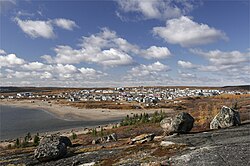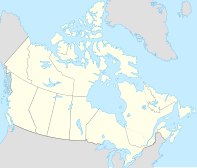Kuujjuaq (northern village)
|
Kuujjuaq ᑰᔾᔪᐊᖅ |
|
|---|---|
| Northern village municipality | |

Kuujjuaq
|
|
| Coordinates (Hôtel de ville Katittavik, 400, chemin de l'Aéroport): 58°06′24″N 68°23′55″W / 58.10667°N 68.39861°WCoordinates: 58°06′24″N 68°23′55″W / 58.10667°N 68.39861°W | |
| Country |
|
| Province |
|
| Region | Nord-du-Québec |
| TE | Kativik |
| Constituted | December 29, 1979 |
| Government | |
| • Mayor | Tunu Napartuk |
| • Federal riding | Abitibi—Baie-James—Nunavik—Eeyou |
| • Prov. riding | Ungava |
| Area | |
| • Total | 385.70 km2 (148.92 sq mi) |
| • Land | 292.72 km2 (113.02 sq mi) |
| Population (2011) | |
| • Total | 2,375 |
| • Density | 8.1/km2 (21/sq mi) |
| • Change (2006–11) |
|
| • Dwellings | 925 |
| Time zone | EST (UTC−5) |
| • Summer (DST) | EDT (UTC−4) |
| Postal code(s) | J0M 1C0 |
| Area code(s) | 819 |
| Website | www |
Kuujjuaq ([kuːjːuɑq̚] Inuktitut: ᑰᔾᔪᐊᖅ) is the largest northern village (Inuit community) in Nunavik, Quebec, Canada with a population of 2,375 as of the Canada 2011 Census. It is the administrative capital of the Kativik Regional Government and lies on the western shore of the Koksoak River.
Kuujjuaq used to be known as Fort Chimo. Chimo is a mispronunciation of the Inuit phrase saimuuq, "Let's shake hands!" Early fur traders were often welcomed with this phrase which they adopted as the name of the trading post. It was also adopted by Canadian Combat Engineers. A fictional account of this naming is found in the novel Ungava by Robert Michael Ballantyne.
The first Europeans to have contact with local Inuit were Moravians. On August 25, 1811, after a perilous trip along the coasts of Labrador and Ungava Bay, Brother Benjamin Kohlmeister and Brother George Kmoch arrived at an Inuit camp on the east shore of the Koksoak River, a few kilometers downstream from the present-day settlement. Their aim was to convert "the Esquimaux to Christianity." According to the journal kept by Brother Kohlmeister, Inuit of the Koksoak River were very interested in having a Moravian mission in the area.
Around 1830, the Hudson's Bay Company (HBC), today a department store chain, started the fur trade business in Nunavik by establishing their first post on the east shore of the Koksoak River, about 5 km downstream from the present-day settlement. The post closed in 1842, then reopened in 1866. At that time, Inuit, as well as Montagnais and Naskapi, came to trade at the post.
...
Wikipedia


